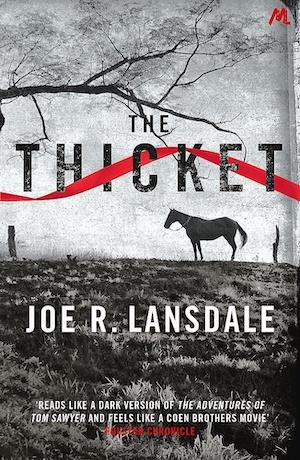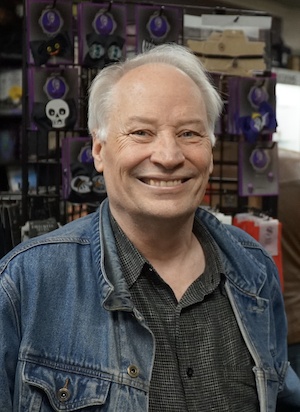One of our favourite American authors joins us today to talk about humour in fiction, and if you’ve read any of Joe R Lansdale’s books you’ll know that he’s a writer whose work is made all the more appealing by the fact that it makes you laugh. He has an eye for the stranger things in life, the idiosyncrasies of both heroes and criminals, the situations they get themselves into… and he rolls plenty of irony into his stories as well.
Joe has put together a little essay for us which will be of interest not only to his regular readers, but also to anyone who’s setting out as an author and is grappling with the tricky issue finding and expressing humour in your story.
HUMOUR IN FICTION
by Joe R Lansdale
Humor in fiction is not writing a story and having a few jokes inserted, or writing jokes and then writing a story around them.
Fact is, stories that are mostly jokes aren’t stories. The idea of inserting humor into crime fiction, or any kind of fiction, isn’t the idea. The idea of blending humor into it ‘naturally’ is the more workable and satisfying method. It’s a blend, not a fruit salad.
It’s about having a sense of humor about the world, even the bad parts. As my character Shorty says in The Thicket, “Everything is funny but your own death. But others will laugh.”
I suppose it’s fair enough to say I’m noted for this kind of thing, and it’s also fair to say I don’t always do it. Stories are their own thing and have their own bones, blood and flesh. Sometimes those items are richer in humor than others. Sometimes humor is too offended by the proceedings to show up.
Bottom line is I never start out or plan to write funny. It is how I see the world, at least at a comfortable distance. It’s my natural world view, so I don’t have to hunt for it or cleverly insert it. It grows out of the story that grows out of my brain. It’s situational humor for the most part, and it’s not always pleasant humor.

Fact is, the bulk of humor is meant to be nasty, uncomfortable, and true in its own way. As Mark Twain said, “Genuine humor is replete with wisdom.” Benjamin Franklin, perhaps the founder of American folk humor before Twain perfected it, said, and I paraphrase, “having your reader laugh with you, you’re halfway to getting them to agree with you.”
Mark Twain also said, “There is no humor in heaven.”
The idea, at least from my viewpoint, is that heaven, being a place of kindness, soft beds and sweet-twanging harps, can’t deal with that, because humor concerns someone’s pain, discomfort, embarrassment, and so on.
That’s not very heavenly.
A person falling off a ladder, hitting their head on a wall, tumbling into a kid’s rubber pool, and coming up with a rubber duck in their mouth, is not funny when it happens. But observing it. Or being able to think back on it, well, it can have a slightly different feel. It can be funny, though that humor will not be allowed in heaven, and if you laugh, you’re on your way to a worse place, but at least folks there can have a good cackle over mayhem and murder and the fact that you forgot to pull up your zipper and part of you is hanging out.
Slapstick humor in film, for example, is always about pain, or nearly being killed, or even being killed.
Though slapstick humor can be funny. Stepping on a rake and having the handle of it hit you between the eyes is an amusing sight gag, especially if the person involved can’t keep from doing it again and again. But the best and more satisfying humor for me is situational. What I like is the funny line that comes naturally out of the mouth of a character, and they don’t know it’s funny.
If they do know it’s funny, and they’re trying to be funny, then it works best if it’s based on the history of the characters in the story. You know them. You know how they think. A smart remark a character makes might not work outside the novel, but it works well within context of the story, and is funny.

In my Hap and Leonard series, Hap always has terrible jokes he’s trying to tell his friend Leonard, but the humor in the books isn’t the joke itself, but the fact Hap seems to think these jokes are funny, and Leonard thinks they are not, or he’s already heard Hap tell them. A lot. It’s the juvenile play between them that works because we know who they are, and how they purposely annoy one another. It’s the situation of how they deal with each other that’s humorous. Not the joke. Though, if someone finds the jokes funny, that’s extra icing on the cake. But the humor actually lies in their relationship.
Robert Bloch, a fine writer, could be jokey, but at his best he was just funny, banging on about disembowelments and horrible deaths, monsters and so on. He once told me humor and horror are flip sides of the same coin. I believe him. I learned a lot from him. He could also joke, by the way, and he was funny, because more than the joke was his timing and delivery. He’s the one that came up with the line (as far as I know he did) that is often accredited to Stephen King, who clearly knows he’s quoting Bloch. The joke is: “I have the heart of a small boy. I keep it at home in a drawer in my desk.”
So, okay, jokes have their place. That’s a good one.
Bloch is best known as the author of Psycho, and that novel, though disturbing, is also funny as hell. Only Norman Bates, the murdering protagonist, doesn’t see any humor in it at all. At least, not the way we readers do. It’s a not a book of jokes, but it is full of dark humor.
Alfred Hitchcock, who made the book into a classic film saw the amusement inside the horror. No doubt that’s why he wanted to film it. He and Bloch had a similar sense of humor. In one way, Psycho is a dark comedy with a lot of comic tension and irony. From another viewpoint, it’s terrifying, disturbing and downright chilling. Both views are correct. And the reason it’s really chilling is that darkly horrible humor gives it a deeper bite.
All right, I’m muddling a bit. And let me tell you why. Truth is, I have a few ideas about humor in fiction, but nothing definitive. They are my ideas. You can look at them, sort them about, and maybe they will be helpful.
But there are no absolutes. That’s kind of a motto of mine. If fiction comes from within, and is not created like a blue-print, if you have a sense of humor, you’ll find it, and express it. That’s it in a nutshell.
Finally, while I’m laying out my profound advice, I’m not sure writing humor in fiction can be taught. There really are people who have little to no sense of humor because they have very little imagination, or take everything seriously, and are easily offended. Everything is somehow offensive to them. Everything in life is as serious as drowning a crippled puppy in the toilet, knowing full well it’s too big and hairy to flush properly.
Watch out for Joe’s upcoming short story collection, Things Get Ugly, out 15 August. It’s full of crime and will make you laugh too. For a sample, check out the short story Billie Sue on our site.
